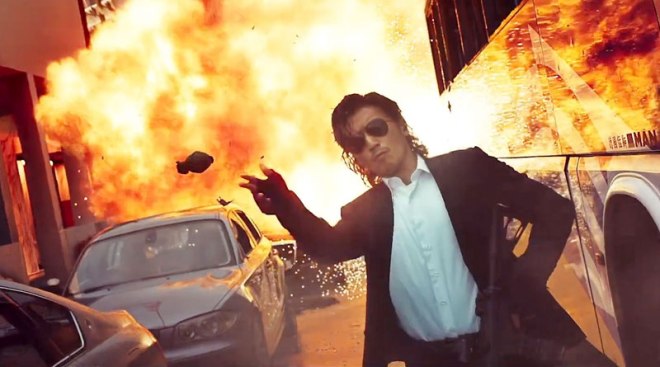After seemingly an eternal wait for the arrival of the highly-anticipated Raging Fire <怒火>, it’s finally here and it was sadly Benny Chan’s final work before his death last August due to nasopharyngeal cancer.
In Raging Fire <怒火>, which marks the late director’s return to the modern action genre (his last one was 2013’s The White Storm <掃毒>), Chan — who co-wrote the screenplay with Ling Wai-Chun (One Second Champion <一秒拳王>) and Tong Yiu-Leung (2009’s Give & Love <愛得起>) — chose to stick to the tried-and-true formula.
Following a botched police raid that killed the whole team (a shade of Chan’s own New Police Story <新警察故事>), Regional Crime Unit inspector Cheung Shung-Bong (Donnie Yen, looking dapper in a suit) soon discovers it has something to do with a group of masked criminals led by Yau Kong-Ngo (Nicholas Tse). And as it turns out, Ngo was Bong’s protégé used to work in the police force. But Ngo ends up in prison after causing the death of a suspect and among some of the police who testified against him are Bong himself.
After being released from prison, Ngo and his former subordinate (Henry Mak’s Chiu, Yu Kang’s Mok, German Cheung’s Chu and Tony Wu’s Law) have since sought revenge against whoever caused their imprisonment in the first place.
Clocking at 126 minutes, Raging Fire <怒火> relies heavily on multiple flashbacks to stretch the otherwise straightforward action movie, detailing Ngo’s rise and fall before his eventual sentence to imprisonment. While the extended flashbacks are clearly meant for us to understand more about Ngo’s cause for rage and resentment, the movie is largely surface-level storytelling. It somehow lacks a certain narrative prowess in terms of emotional and dramatic beats.

Fortunately, Nicholas Tse’s overall committed performance as the charismatic Yau Kong-Ngo does help elevate the movie from mediocrity. It was also nice to see him return to acting (he was last seen heading the cast in 2017’s Cook Up A Storm <決戰食神>) after spending the last few years venturing into another career as a chef. Donnie Yen, who previously collaborated with Tse in Dragon Tiger Gate <龍虎門> (2006) and Bodyguards And Assassins <十月圍城> (2009) does a good job playing the typical straight-arrow cop role who values righteousness above all else.
Surprisingly enough, this is the first and sadly the last time Donnie Yen gets to work with Benny Chan in a feature film after they collaborate in the popular ATV series Fist Of Fury <精武門> back in 1995. In a perfect world, it would be great to see them working together in more future projects just like how Benny Chan had a great partnership with Jackie Chan in Who Am I? <我是誰> (1998), New Police Story <新警察故事> (2004) and Rob-B-Hood <寶貝計劃> (2006).
Speaking of the Benny Chan-and-Jackie Chan collaboration, there was a report that Jackie himself revealed they were initially planning to work on three high-profile projects. And that includes New Police Story 2 <新警察故事2> and Rob-B-Hood 2 <寶貝計劃2> as well as a new Drunken Master <醉拳> movie. It would have been a dream comes true for many Hong Kong movie fans if Benny Chan is still alive fulfilling these aforementioned movies.

Interestingly enough, Raging Fire <怒火> was originally intended to be an international action movie under the title of Crossfire <火拼> when it was first announced back in 2018. The movie would feature Donnie Yen as a former Hong Kong police inspector who travels to South America to save his kidnapped wife. But due to budgetary concerns, Crossfire <火拼> was subsequently rewritten as a Hong Kong-set action movie.
Now, even with the formulaic storyline in Raging Fire <怒火>, there are a few interesting callback moments that fans of both Benny Chan and Donnie Yen’s works would find throughout the movie. This includes the aforementioned New Police Story <新警察故事> as well as others like Divergence <三岔口> and Rob-B-Hood <寶貝計劃> while Donnie Yen, who also served as the movie’s action director, has a fight sequence that pays homage to SPL <殺破狼>. This is particularly evident during the scene where Bong squares off against Ngo in the church where they use a collapsible baton and knives respectively. Except in the case of Ngo, his choice of weapons is butterfly knives.
Nicholas Tse, who trained hard for his physically demanding role under the guidance of Donnie Yen, has again proved his agility during the fight scenes. And just like how he fought so convincingly as an experienced martial artist in Dragon Tiger Gate <龍虎門>, Tse’s moves are equally impressive in Raging Fire <怒火>.
Despite having Donnie Yen in the lead role, don’t expect this to be an all-out action movie that focuses more on hand-to-hand combats. Even so, the otherwise sparse fight sequences are both engaging and visceral enough with the help of Benny Chan’s dynamic camerawork and Curran Pang’s judicious editing. Instead, Raging Fire <怒火> rather belongs to the mould of Big Bullet <衝鋒隊─怒火街頭>, the 1996 action-movie classic that first established Benny Chan as one of the most promising directors in the genre twenty-five years ago.
As expected, the movie contains several shootout scenes, particularly the one involving a massive gunfight in the middle of busy traffic is worth mentioning here. Raging Fire <怒火> also featured one of the best chase scenes I’ve ever seen in recent years in a Hong Kong action movie — a high-speed motorcycle-and-SUV pursuit, which is featured prominently in the trailer.
Some of the flaws aside, Raging Fire <怒火> reminds us there is still life left in the otherwise dying state of Hong Kong mainstream cinema. Even after almost a year since Benny Chan’s death has left a huge gap in the Hong Kong film industry, the fact that he’s no longer with us does resonate a lot. Not to mention the sad reality that there aren’t many high-profile Hong Kong filmmakers left other than existing ones, namely Herman Yau and Dante Lam capable of making big-budget action movies at such a magnitude.

Disclosure: I have also reviewed Raging Fire <怒火> for The Cinemaholic. Please note that the content of the above review is completely different from the one published at The Cinemaholic.

